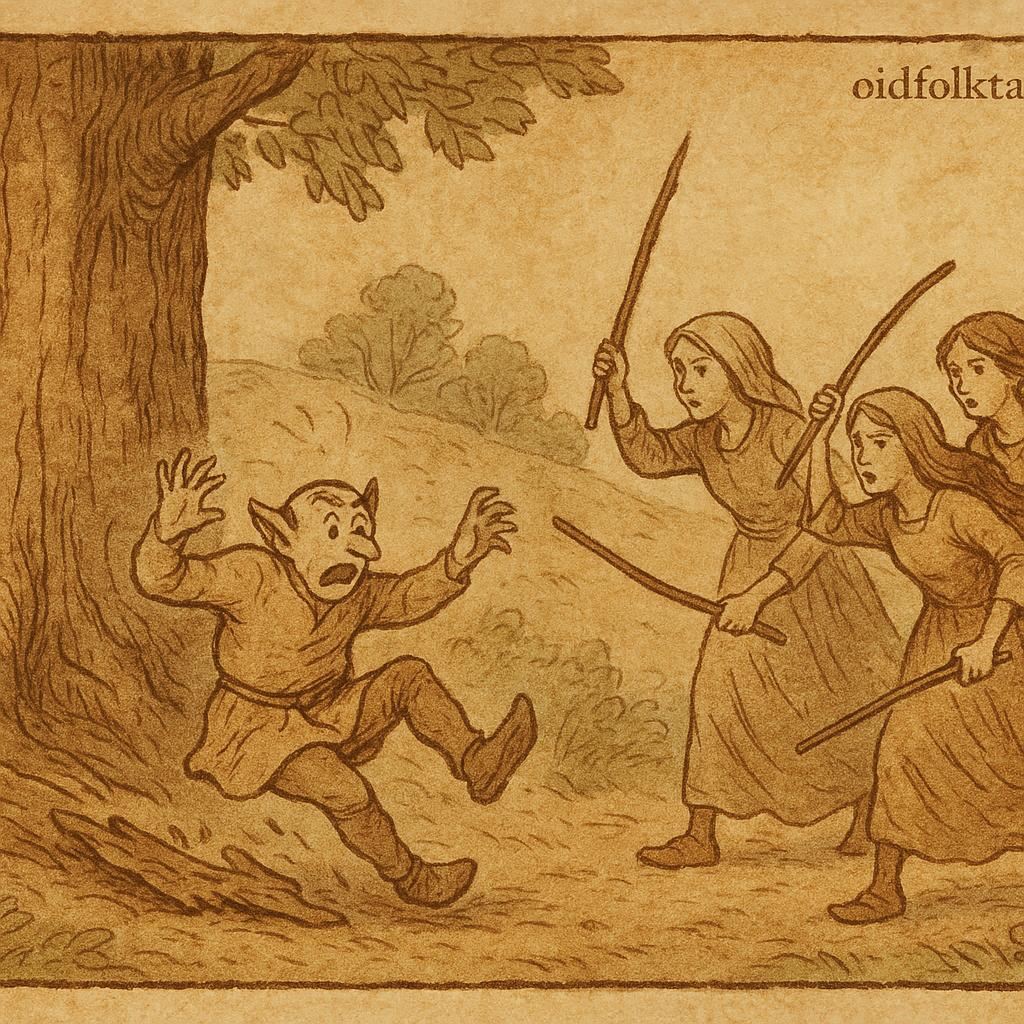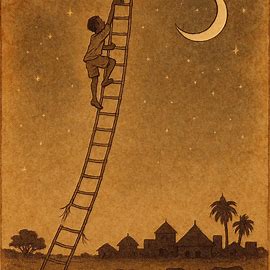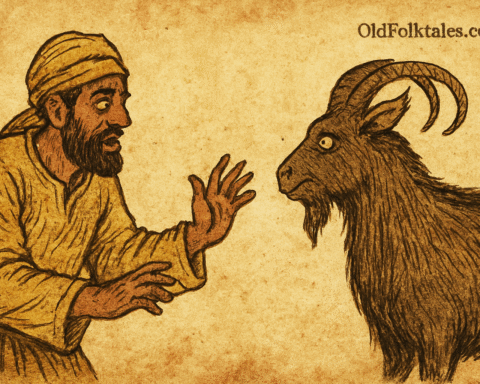Once there was a woman who lived peacefully with her husband and their three daughters. For many years, her household was filled with laughter, warmth, and stability. But one day her husband died, and the rhythm of her life broke apart. The house felt empty, the days seemed endless, and the silence pressed heavily upon her heart. She mourned deeply, not only for her husband but also for the companionship that had shaped her life. She did not like living alone.
After some years, the woman met another man named Shigosh. He was gentle and kind, a man with a quiet spirit and good heart. But Shigosh had one visible flaw: he walked with difficulty, for one of his thighs had been broken long ago. He moved with a limp, his steps uneven, his gait marked by struggle. Yet this did not matter to the woman. She loved him—his heart, his patience, even his brokenness.
But her daughters were filled with scorn. They laughed openly at Shigosh, mocking the way he walked. Their rudeness and sharp tongues frightened their mother, who feared that they would never allow her to remarry.
“My daughters will not accept a new father,” she confessed sadly to Shigosh. “They will never bless our union. We must meet in secret.”
So outside the village stood a great tree, tall and leafy, whose shade touched the edge of the river. Every day the woman went there, climbing among the branches to hide, and she would sing softly,
“Shigosh, Shigosh,
Here in the tree,
Your wife is waiting.
Come to me!”
READ THIS: How the Dog Lost Her Voice: Ethiopian Folktale
Hearing her voice, Shigosh would hurry toward the tree, limping quickly despite his difficulty, and sing in reply:
“My wife, yes! Waiting for me!
My wife, yes! Under the tree!”
The woman smiled each time she heard his uneven, limping song. “He sings as he walks,” she thought, “and I love him for it.” Beneath that tree, they found happiness, away from the judgment of her daughters.
But secrets are fragile. One day the eldest daughter discovered her mother’s hidden love. She rushed to her sisters, anger blazing in her words.
“Our mother loves Shigosh,” she said bitterly. “She meets him under the great tree.”
The second daughter scoffed. “She loves that foolish old man who cannot even walk properly? A man who limps?”
The youngest clenched her fists. “We cannot let him take our father’s place. We must act.”
Together, they schemed. They stripped bark from a tree and soaked it in water until it became slippery. Then they laid it across the path to the great tree, preparing a cruel trap.
“You, youngest,” said the others, “your voice is like our mother’s. Sing her song. Shigosh will come, thinking it is she. He will slip on the bark, and when he falls, we will kill him.”
The youngest climbed into the tree and began to sing sweetly,
“Shigosh, Shigosh,
Here in the tree,
Your wife is waiting.
Come to me!”
Hearing the familiar call, Shigosh limped eagerly toward the tree. He answered,
“My wife, yes! Waiting for me,
My wife, ye, ”
But he never finished. His foot struck the slippery bark, and he fell heavily to the ground. At once, the three sisters rushed at him, beating him with sticks until his life was gone. They dragged his body beneath the leaves of the tree and covered it, hiding their crime.
Then they crossed the river and climbed another tree, calling out deceitfully to their mother:
“Mother! Go to your lover. He waits for you!”
The woman heard them and trembled. “Oh, they know about Shigosh,” she thought in fear. She hurried to the tree, but found no smiling lover. Instead, she heard the buzzing of flies. Looking beneath the leaves, she discovered Shigosh’s lifeless body. Grief and fury overwhelmed her.
She looked across the river and saw her daughters hiding in a tree. Crossing quickly, she stood beneath them and called to the eldest:
“My oldest child,
Up there in the tree.
I carried you in my womb.
Come down to me!”
But the eldest refused. “No, Mother. I will not come down.”
She called to the second:
“My second daughter,
Up there in the tree.
Your blood is my blood.
Come down to me!”
But the second also refused.
Finally, she pleaded with her youngest:
“My youngest daughter,
Up there in the tree.
I love you best.
Come down to me!”
But even the youngest answered coldly: “No, Mother. I will not come down.”
Fury replaced sorrow. The woman lifted an axe and struck at the tree. Her blows were strong, and soon the trunk cracked. The tree fell across the river, forming a bridge. The eldest and second daughters ran across and escaped. But the falling trunk crushed the youngest, breaking her thigh bone.
From that day on, the youngest could never walk properly. She limped as Shigosh had once limped. And the people said, “See how they mocked him for his limp, and now God has judged her with the same fate.”
Moral Lesson
This story teaches that cruelty, mockery, and betrayal never go unpunished. The daughters laughed at Shigosh’s limp, despised their mother’s love, and acted with violence. But fate returned their cruelty upon them, leaving the youngest marked with the same limp. Respect, kindness, and humility are virtues, while scorn only brings ruin.
Knowledge Check
Who was Shigosh in the story?
Shigosh was the kind man with a broken thigh who loved the widow.
Why did the woman and Shigosh meet in secret?
Because her daughters mocked him and refused to accept a new father.
What trap did the daughters set for Shigosh?
They placed slippery bark on the path and tricked him with a false song.
What happened when Shigosh fell?
The daughters beat him with sticks and killed him.
What fate befell the youngest daughter?
Her thigh was broken by the falling tree, and she walked with a limp.
What is the main lesson of this Ethiopian folktale?
Cruelty and mockery bring punishment, while kindness and respect should guide our lives.
Source: Ethiopian folktale, Gambela region






